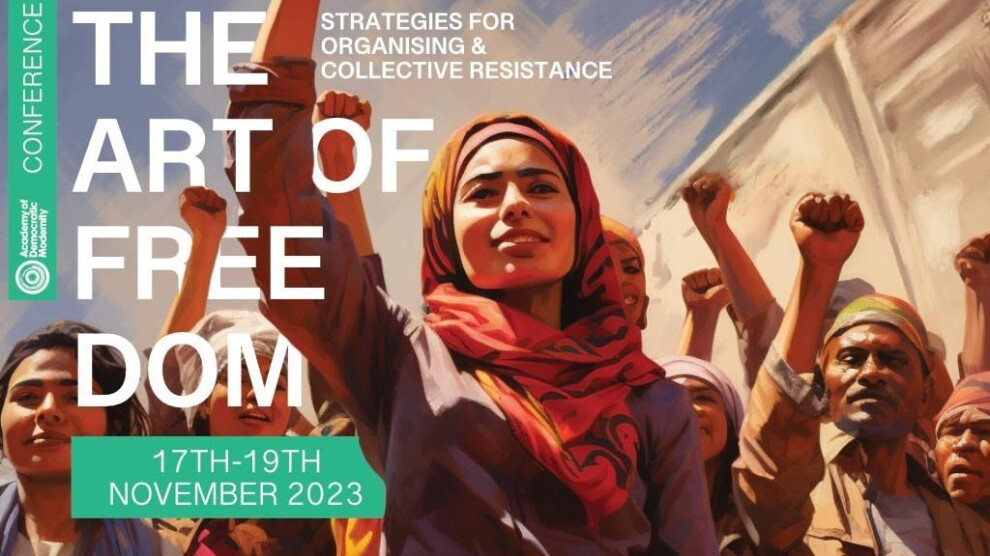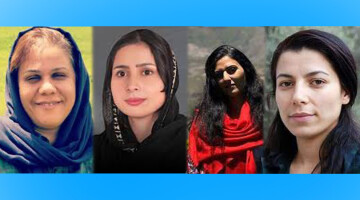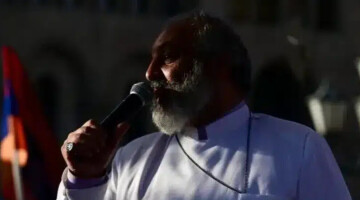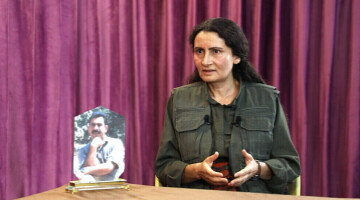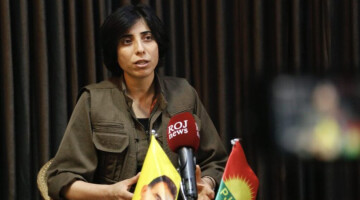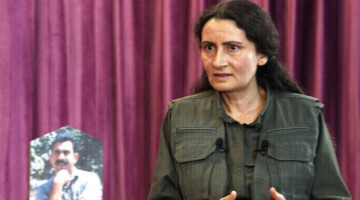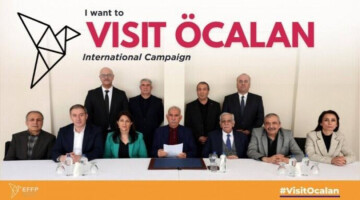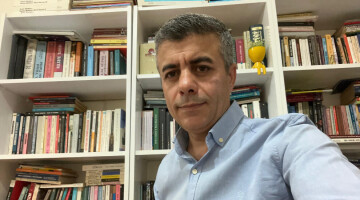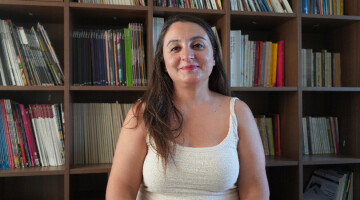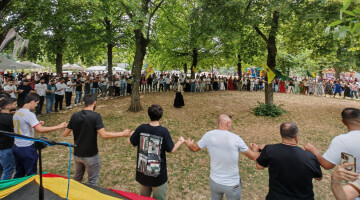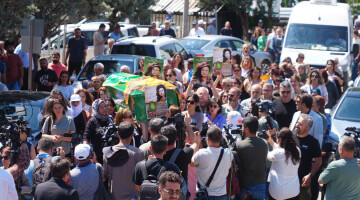The Academy of Democratic Modernity (ADM) is organising a conference in Basel on 17-19 November under the title “The Art of Freedom - Strategies for organising & collective resistance”.
The conference will discuss paths out and perspectives on solutions in the face of the growing crisis of capitalist modernity and its multiple manifestations. The conference aims to generate a collective space to identify common challenges, to try and create answers, for questions to blossom and for intellectual exchange on the practice and concepts between various movements.
What are the fundamental aspects of the urgent and radical intellectual, moral and political renewal of opposition to the system? Starting from this question, the organisers want to collectively discuss different aspects of resistance against the system at this conference. Besides the necessary theoretical debate, different movements will share their experiences and strategies to think together about strengthening their practice and common struggle.
“An international democratic intervention that opposes the system is more necessary than ever in this era of crisis. Social problems are increasingly aggravated. Democratic forces are confronted with the challenge of (re)politicising societies and creating democratic subjects. Politics that are not based on state and power, but on the grassroots diffusion of political power in society, is the art of freedom. This type of social politics creates the possibility for liberation. Democratic and popular forces and those against the hegemonic system must reclaim their history of resistance and further this legacy by creating spaces in which freedom is learned and lived immediately,” said the Academy of Democratic Modernity.
The conference will seek to address central questions that are currently facing emancipatory and liberatory politics. How can we connect the idea of democratic socialism with the concrete reality of life today? What is the role of intellectual struggle, historical consciousness, ecology, women's liberation, class struggle, etc.?
“On the other hand, we are still confronted with the politics of the nation state that homogenises societies and which leads a permanent struggle against a multi-ethnic, multicultural society. In various places around the world, social movements are resisting capitalist colonialism and peoples and societies repeatedly exert their right to self-determination. Therefore, a central theme will be perspectives of self-determination and autonomy in the 21st century. However, emancipatory politics today is not only confronted with the question of a correct theory that provides answers for the intricate reality of practice. What forms of organisation and institutions should the forces of democratic modernity take in building a more peaceful, safe, ecological and just world?”
The conference aims to generate a collective space to identify common challenges, to try and create answers, for questions to blossom and for intellectual exchange on the practice and concepts between various movements. Meanwhile, it wants to bridge gaps between struggles, broaden our common perspectives, and weave together strategic lines of resistance. It is an invitation to lay new bricks in the theoretical and practical construction of strategies for organising and collective resistance. The conference sees it as a critical task to initiate dialogue on the respective strategies of political forces.
“We look forward to your participation in this common space of construction to promote dialogue between struggles for freedom. Let us weave common threads of resistance from local experiences and global perspectives and express a strength of unity of diversity and autonomies. We want to amplify the voices of popular struggles for freedom and share our experiences of resistance and building of radical alternatives. We want to shout it out together: Another world is not only possible – given the world situation, it is fiercely needed,” the organisers stated.
Some of the organisations to attend the conference are as follows:
Askapena (Basque Country), Walaboomuu (Oromia-Africa), Endavant (Catalonia), Potere al Popolo! (Italy), Red Nacional del Comuneras (Venezuela), Sudan Communist Party (Sudan), Abahlali baseMjondolo (South Africa), Initiative Resistance and History (Germany), Transnational Social Strike Platform, Vikalp Sangam (India), Global Tapestry of Alternatives, Congreso de los Pueblos (Colombia), National Democratic Front (Philippines).
The program for the conference is as follows:
16 November 2023 - Thursday
12:00 - 20:00 Arrivals and registration at the venue
17 November 2023 - Friday
08:30 - 09:30 09:30 - 10:00 10:00 - 13:30
Registration
Opening and presentation of the program
Perspectives of (national) self-determination and autonomy in the 21st century
- ― Rethinking self-determination through the paradigm of Öcalan (Mahmut Şakar)
- ― The liberation struggle in Euskal Herria (Askapena)
- ― People centered pan-Africanism and the Oromo struggle
(Walaboomuu | Complete Liberation)
- ― Països Catalans: The struggle in the Catalan countries in the 21st century (Endavant | OSAN)
Lunch
Between people’s power and liberal democracy - Traps and necessities in the struggle for liberation
― Potere al Popolo! (Italy)
― Red Nacional del Comuneras (Venezuela)
― Sudanese Communist Party (Sudan)
― Abahlali baseMjondolo (South Africa) online participation
13:30 - 15:00 15:00 - 18:00
18:15 - 20:00
Women's Assembly
18 November 2023 - Saturday
09:30 - 13:00
Workshops for deepening different aspects towards a theoretical and practical renewal of system opposition
- History and Resistance: The hidden flowers of democratic modernity (Initiative Resistance and History)
- Womenʼs liberation and Democratic Socialism from the perspective of Jineolojî (Jineolojî Committee Europe)
- Transnational class struggle in the 21st century (Transnational Social Strike Platform)
- Democratic Youth Confederalism: The youth in the struggle against capitalist modernity (Youth Writing History)
- Local Democracy and More-than human governance (Vikalp Sangam, India)
Lunch
Summary and conclusions from workshop discussions
Building democratic autonomy in North Kurdistan - Experience and reflections
Bedia Özgökçe, co-mayor of Van Metropolitan Municipality Fırat Anlı, former co-mayor of Amed Metropolitan Municipality, Tuncay Ok, Kurdish activist
Dinner and cultural event
13:00 - 14:30 14:30 - 16:00 16:15 - 18:30
19:00 - 21:30
19 November 2023 - Sunday
09:30 - 11:00
11:30 - 15:30
The idea of socialism: Towards a renewal
- ― 21st century: The Era of Womenʼs Revolution (Women Weaving the Future)
- ― To insist on Socialism means to insist on Humanity (Academy of Democratic Modernity)
The question of bottom-up organization and internationalism
- ― Experience of weaving alternatives (Global Tapestry of Alternatives)
- ― Building peopleʼs power in Colombia (Congreso de los Pueblos)
- ― Perspectives of revolutionary organization in the Philippines
(National Democratic Front of the Philippines)
- ― Achievements, challenges and perspectives from the Kurdistan Liberation Struggle
Discussions
Lunch and farewell
About the Academy of Democratic Modernity
The Academy of Democratic Modernity strives to spread the ideas and rich experience of the Kurdistan Freedom Movement and its paradigm of Democratic Modernity. Its publication activities are intended to start discussions with activists, academics and various anti-system groups and social movements in order to move forward in our search for a radical alternative to capitalist modernity and to realise a free life. Through its educational work, the academy wants to create a new understanding of democratic politics, social enlightenment and a new political-moral consciousness. Some dimensions of social issues ite addresses are the sociology of freedom, weaving together lines of resistance, democratic autonomy, women's liberation, youth autonomy, social ecology, communal economy and art & culture. Through the development of platforms and networks, the academy wants to contribute to the strengthening of the international exchange of experiences and interweave existing struggles, in line with the proposal of World Democratic Confederalism. To overcome capitalist modernity, concrete local and global institutional alternatives are needed. “If we succeed in expanding democratic politics in everyday life - through alliances, councils, communes, cooperatives, academies - the huge political potential of society will unfold and be used to solve social problems. In this sense, we see our activities as a contribution to the unfolding of Democratic Modernity and Democratic Socialism,” the Academy states.

